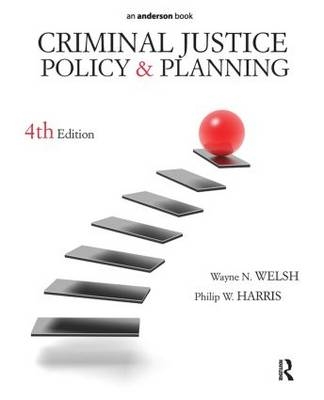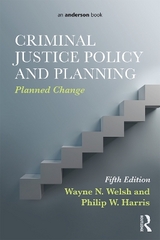
Criminal Justice Policy and Planning
Anderson Publishing (Verlag)
978-1-4377-3500-0 (ISBN)
- Titel erscheint in neuer Auflage
- Artikel merken
Unlike other textbooks on the subject, Criminal Justice Policy and Planning presents a comprehensive and structured account of the process of administering planned change in the criminal justice system. Welsh and Harris detail a simple yet sophisticated seven-stage model, which offers students and practitioners a full account of program and policy development from beginning to end. The authors thoughtfully discuss the steps: analyzing a problem; setting goals and objectives; designing the program or policy; action planning; implementing and monitoring; evaluating outcomes; and reassessing and reviewing. Within these steps, students and policy-makers focus on performing essential procedures, such as conducting a systems analysis, specifying an impact model, identifying target populations, making cost projections, collecting monitoring data, and performing a meta-analysis, In reviewing these steps and procedures, readers can develop a full appreciation for the challenges inherent in the process and understand the tools required to meet those challenges.
To provide for a greater understanding of the material, the text uses a wide array of real-life case studies and examples of programs and policies. Examples include policies such as Restorative Justice, The Second Chance Act, Three Strikes Laws, and the Brady Act, and programs such as drug courts, boot camps, and halfway houses. By examining the successes and failures of these innovations, the authors demonstrate both the ability of rational planning to make successful improvements and the tendency of unplanned change to result in undesirable outcomes. The result is a powerful argument for the use of logic, deliberation, and collaboration in criminal justice innovations.
Wayne N. Welsh is a Professor of Criminal Justice at Temple University. He has conducted research in two broad areas: (1) applications of organizational theory to criminal justice and examinations of organizational change, and (2) theories of violent behavior and intervention/prevention programs. Welsh has been Principal Investigator or Co-Principal Investigator on numerous federal and state-funded research grants, and is currently working on a a national collaborative research project, project on Criminal Justice Drug Abuse Treatment Systems. Philip W. Harris is an Associate Professor in the Department of Criminal Justice at Temple University. His teaching and research have focused primarily on the areas of juvenile justice, juvenile correctional strategies, and organizational and system development. He serves as the strategic planning adviser to the Council of Juvenile Correctional Administrators, which he co-founded in 1994, and is a member of Pennsylvania’s Juvenile Justice and Delinquency Prevention Committee.
Introduction 1. Analyzing the Problem 2. Setting Goals and Objectives 3. Designing the Program or Policy 4. Action Planning 5. Program/Policy Implementation and Monitoring 6. Evaluating Outcomes 7. Reassessment and Review Appendix A: A Seven-Stage Checklist for Program and Policy Planning
| Erscheint lt. Verlag | 20.3.2012 |
|---|---|
| Verlagsort | Cincinnati |
| Sprache | englisch |
| Maße | 191 x 239 mm |
| Gewicht | 454 g |
| Themenwelt | Recht / Steuern ► Strafrecht ► Kriminologie |
| Schlagworte | Strafjustiz |
| ISBN-10 | 1-4377-3500-2 / 1437735002 |
| ISBN-13 | 978-1-4377-3500-0 / 9781437735000 |
| Zustand | Neuware |
| Haben Sie eine Frage zum Produkt? |
aus dem Bereich



